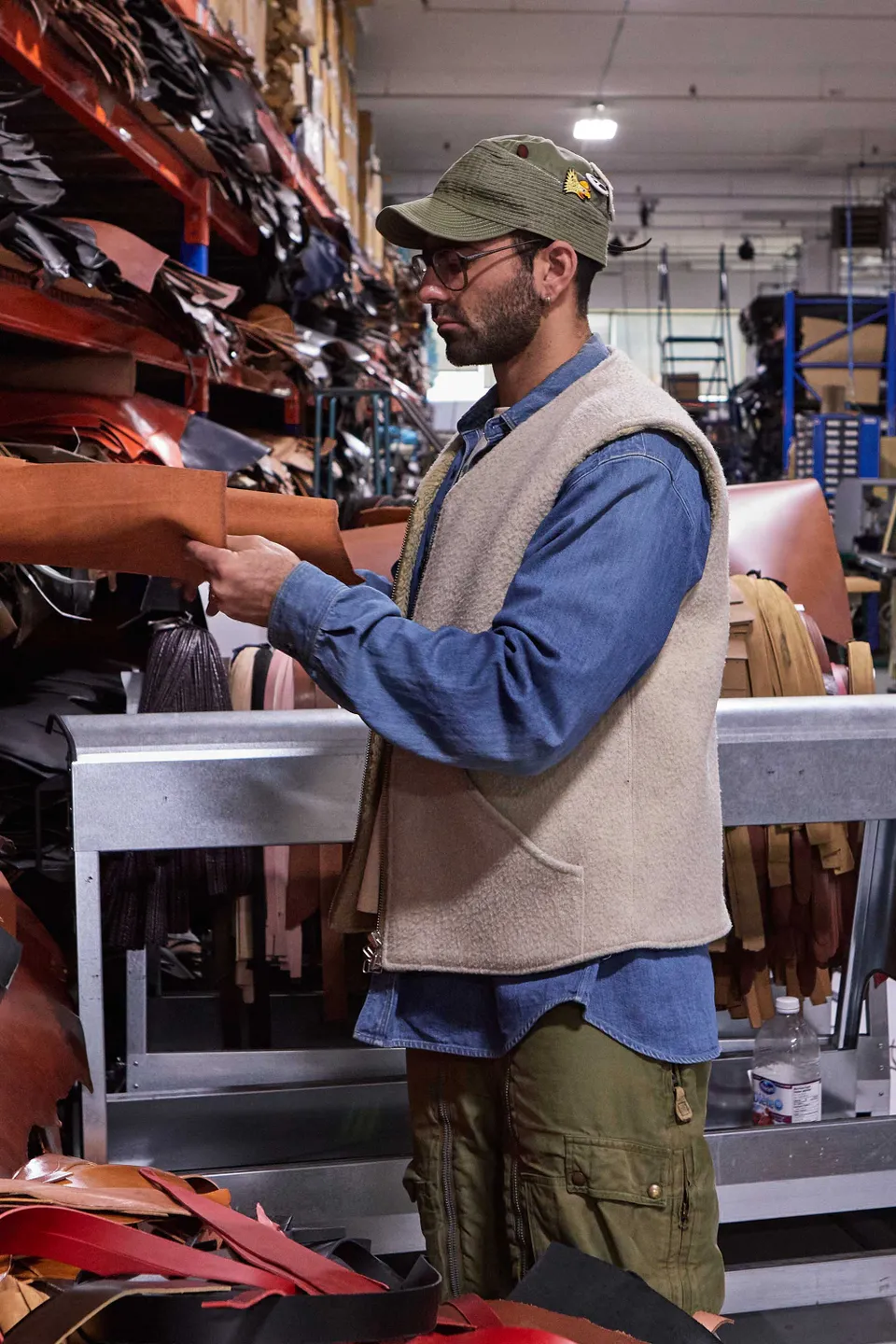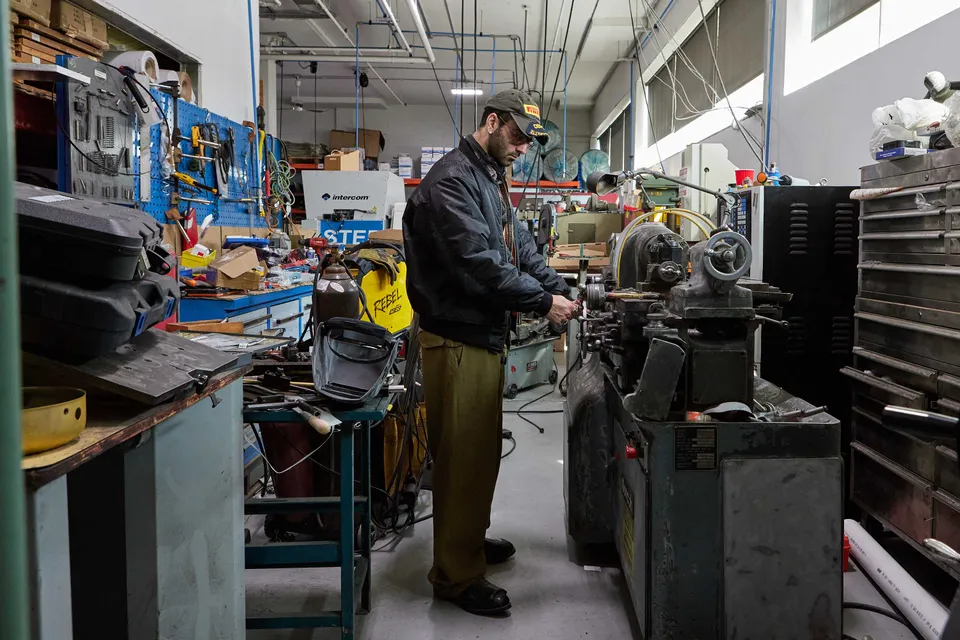
Sign up to receive the Vogue Business newsletter for the latest luxury news and insights, plus exclusive membership discounts.
Creator and former streetwear brand owner William Lasry had been making fashion-related videos reviewing sneakers and showcasing his outfit of the day on YouTube for 10 years, to a humble “few-thousand” subscribers. In 2022, he switched to TikTok and posted a video on the mill where Supreme makes its hoodies. Overnight, it received half-a-million views. Sensing the potential, he set himself a goal to post a video every day for 60 days about where brands manufacture their product. Lasry now has almost 500,000 TikTok followers and his content has garnered 5.4 million likes.
Lasry is part of an emerging crop of content creators — other accounts include Imprint Genius, Labwear Studio and Garment Circle — who are opening the doors to fashion manufacturing with videos showcasing factories, and rating popular brands based on their suppliers. These creators are responding to a paradigm shift in fashion: knowing about fabrication and provenance is becoming a new status symbol, as consumers cool on logos in favour of quiet luxury and technical streetwear.
“As a generation raised in the streetwear era, [Gen Z] are true connoisseurs and avid archivists who value knowledge, exclusivity, community and craft,” says Marta Indeka, senior foresight analyst at strategic foresight consultancy The Future Laboratory, on Gen Z’s new-found fascination with manufacturing content. “In some ways, you could say that knowing is the new owning, which explains the appetite for manufacturing and craftsmanship-centric content online.”

William Lasry visits factories and documents it online. Photo: Courtesy of William Lasry
Many of those interested in this type of content head nascent brands or dream of starting a fashion business, and want to learn how the manufacturing side works. “Everyone loves to see the behind the scenes,” says Imprint Genius founder Isaac Hetzroni. “From a ‘GRWM’ video to a ‘day in the life’, it all hits that same fascination. But that interest gets amplified with this topic as it is showing the behind the scenes of starting a brand, which is a dream of many, making it feel possible and truly within reach.”
In November 2022, Lasry founded Glass Factory, a platform showcasing manufacturers that have been vetted by the team based on various considerations, including certifications, brands they work with, management style and how they treat their workers. So far, Glass Factory has visited factories in Columbia and China, with Portugal and Italy due to follow this year. Content is generally focused on the factories it is willing to recommend to brands, though it does also highlight some brands that appear to use sub-par practices through its rating system.
Across Glass Factory’s social media channels (Instagram, TikTok, YouTube), videos of its factory visits and conversations with suppliers at trade shows have amassed over 100 million views. Follower numbers are ticking up quickly: since January 2023, Glass Factory’s Instagram following has more than doubled to 387,000, and its TikTok account has tripled to 487,000. Its YouTube subscriber base has grown from 5,000 to 228,000. “This info is great not only for people wanting to make clothes, but [also] for the consumer who cares about the materials and quality,” one subscriber responded to a Glass Factory YouTube video.
“You can’t just be obsessed with the way you wear [something]. You also have to be obsessed with how it’s being made. That’s the only way you’ll legitimise yourself as a connoisseur of fashion,” says Petros Analytis, head of research at Glass Factory.
As a former brand owner (he ran streetwear brand Wun-Off from 2018 to 2022), Lasry understands the struggles of finding good manufacturers. And the market is the most competitive it’s ever been, so it’s only becoming more difficult. “Lots of clothing brands sprouted up seemingly overnight during Covid,” says Lasry. “Brands have to differentiate themselves with quality if they want to stand any chance at all.”
Brands are beginning to tap in. Puma, for example, last month launched a series of films featuring its factories in Bangladesh, Vietnam and Turkey, made by Gen Z creators, while UK-based streetwear brand Clints Inc recently shared a video to Instagram showcasing the process of making its sell-out trainers. “We hope that by inviting our ‘Voices’ to experience our supply chain, we’re able to share the genuine progress and passion that our suppliers have invested as well as the realities and challenges we face in our efforts to improve,” said Anne-Laure Descours, chief sourcing officer at Puma, in a release addressing the project.
However, experts warn that — whether creator or brand-led — factory content can never tell the whole story. Ultra-fast fashion retailer Shein faced backlash last year after paying a group of influencers to visit and post content from one of its factories in China. Social media commentators accused Shein of using the trip to paper over poor conditions in other parts of its supply chain, and questioned whether the factory shown was actually purpose built for the trip. (Shein said in a statement at the time that it is committed to transparency, and that the content created was authentic.)
No more gatekeeping
Lasry says Glass Factory is not there to expose the worst offenders. Instead, it seeks to demystify the perceived value or stigmas around manufacturing in certain countries (Glass Factory’s motto is “No more gatekeeping”). To do this, it works on a factory-by-factory basis. “We’re trying to change the way people label things. We no longer want ‘Made in China’ and ‘Made in Italy’, and ‘Made in Portugal’, we want ‘Made in this factory’,” says Lasry.
In a highly globalised industry, it’s rare for one product to be made in just one country, and many supply chains have historically used loopholes to gain more aspirational ‘Made In’ stamps. For example, Analytis points out that although Made in Italy has become such a powerful brand, there are a lot of details people don’t know about. One of the red flags he points to is the large community of Chinese factory workers making garments in the Tuscan city of Prato, Italy. “So you have Chinese manufacturing labelled ‘Made in Italy’ to get that perceived value that comes with it.”
Similarly, Lasry flags that there are plenty of Chinese factories at the forefront of manufacturing quality. “Back in November I was in a factory in China called BlackQ that was making product for Alexander McQueen and the manufacturing was impeccable,” he says of the stigmas and misconceptions around the ‘Made in’ branding. “We just believe that people just need to learn what’s really going on.”
It’s a belief that matches up with current Gen Z attitudes towards sustainability and transparency. “Rock-solid sustainability and regeneration commitments are, for new generations, a need-to-have rather than a nice-to-have. For consumers, behaviours are moving away from materialism and overconsumption in favour of more mindful habits,” agrees Indeka.
She notes that there is an intensified scrutiny of corporate social responsibility as well as a growing awareness of previous greenwashing attempts that have made supply chain transparency a must. Legislation is trying to push the agenda forward: the EU Corporate Sustainability Due Diligence Directive, for instance, requires businesses in the European Union to take accountability for their entire supply chain.
While complex and often flawed, many brands now have commitments to better transparency, which is a sign in itself that consumers are paying attention — though progress remains slow. Lasry predicts that sharing information on suppliers will eventually become an industry baseline. “Not including that information will be like not having an Instagram account, because consumers are going to be demanding that level of transparency.”
文章来源:V
TKFFF公众号
扫码关注领【TK运营地图】

TKFFF合作,请扫码联系!







 闽公网安备35021102002035号
闽公网安备35021102002035号